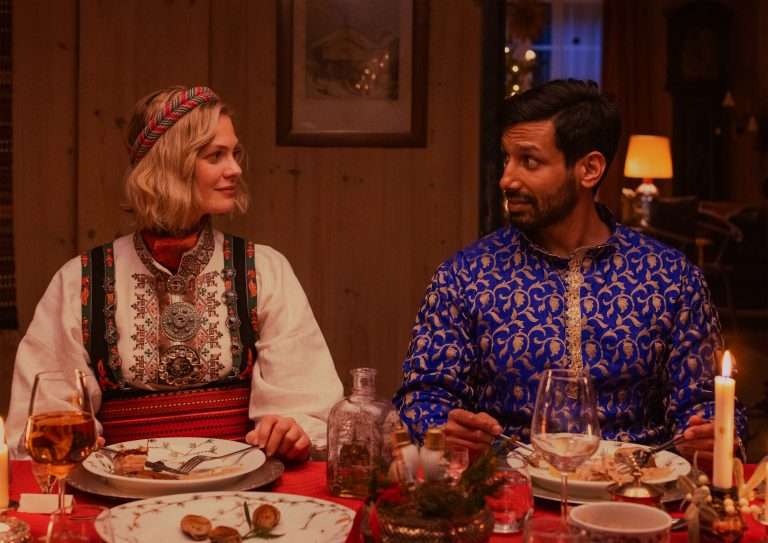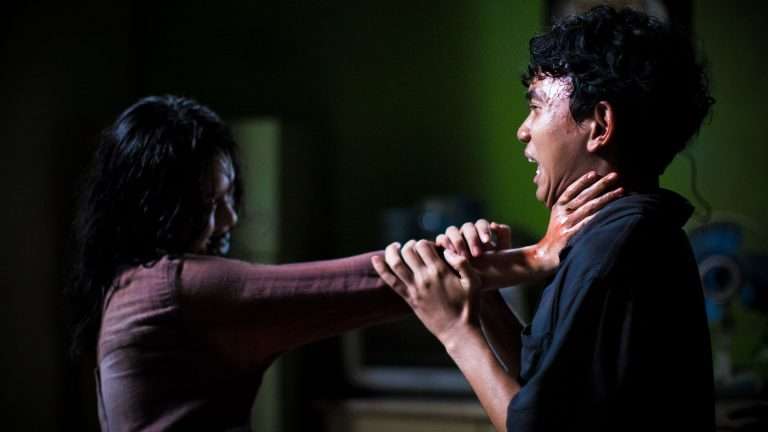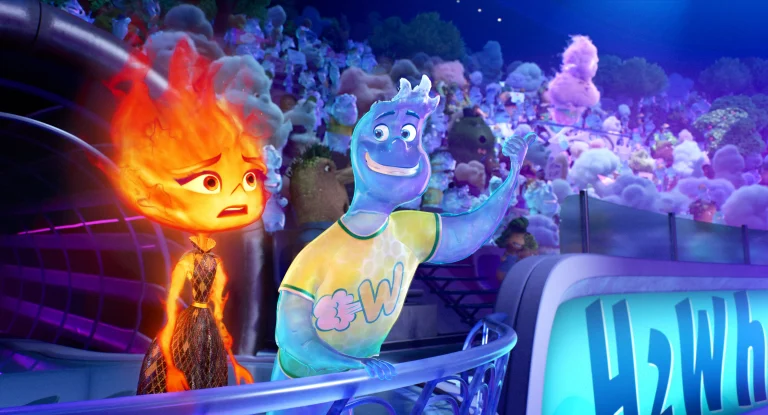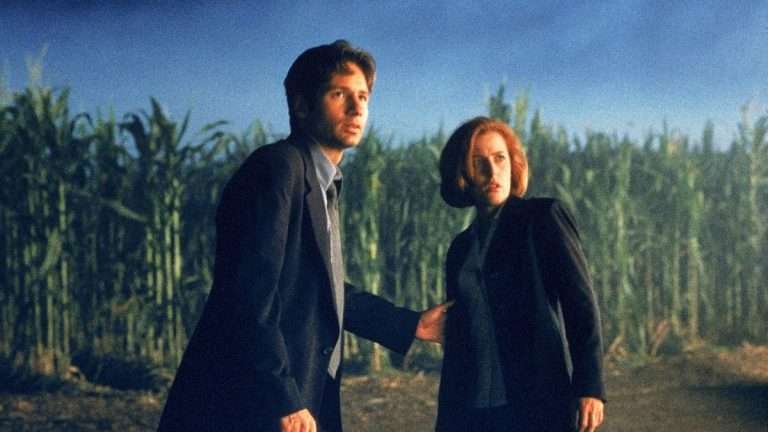Admit it or not, the ‘based on true stories’ tagline lends a strange credibility to films about extraordinary circumstances. It brings an unexpected levity to fiction that might otherwise feel derivative. Take “Eden,” for instance. Without the bizarre real-life history of a handful of European settlers arriving on Floreana Island in the Galápagos, the film might have played like a strait-laced, sun-drenched black comedy—”Cast Away” meets a gloomier take on the trope of friendly neighbors turned feral.
Everyone here carries a film inside their head: a self-declared Baroness recasts herself as an imperial fantasy and transforms the island into her own private drama. Ritter believes he’s orchestrating a philosophical coup through sheer intellectual force, only to spiral into a self-parodic wreck. The film, however, aligns with the quietly enduring Margaret, who bears witness to the madness, tethered to the primal logic of survival.
But the screenplay, written by Noah Pink, undercuts some of the film’s strange power. The language often carries the outsider’s clunky precision—English that feels like it’s been translated directly from something more emotionally textured, as though filtered through the fog of memory. That framing mirrors the elusiveness of history when there aren’t enough voices left to confirm or contradict.
What we’re left with is a version of events—and that version, at times, is painted with the broad brush of Hollywood excess. In its most indulgent moments, “Eden” leans into tinseltown theatrics it doesn’t need. And, at the risk of sounding redundant or even reductive, the sheer sexiness of actors like Jude Law, Vanessa Kirby, Ana de Armas, and Toby Wallace—with the camera rarely resisting the temptation to showcase it—dilutes the film’s darker thesis: that building a civilization from scratch strips people bare, not beautifies them.
Still, it is Ron Howard’s confident, experienced direction that ensures this ship ultimately earns the archival footage it closes with. Margaret Wittmer’s perspective—stoic, resilient, quietly appalled—isn’t wedged in awkwardly; it anchors the film, thanks in large part to Sydney Sweeney’s subtle, measured performance.
Mathias Herndl’s cinematography has the texture of coffee stains on parchment—perfectly fitting for a narrative haunted by unfinished manuscripts and ideas left unsaid. And at its core lies Hans Zimmer’s brazen, sea-soaked score, almost channeling the chakra-like vibrations of the island and coastline. It’s dense, charged, and elemental. What follows is an attempt to pull those threads apart.
Eden (2025) Movie Plot Synopsis and Summary:
Dr. Friedrich Ritter and his partner Dora Strauch flee their native Germany in 1929, rejecting the bourgeois values they believe are corroding humankind’s true nature. On the island of Floreana, part of the Galápagos Islands in Ecuador, Friedrich hopes to focus on writing his manifesto, while Dora turns to meditation to treat her multiple sclerosis. They believe humanity is caught in an endless loop—democracy leading to fascism, fascism to war. To them, God is dead, only humans exist, and civilization must be rebuilt by their own hands. But their hard-won solitude is short-lived.
Who else arrives on the island?
Back in Germany, Ritter’s name begins to appear in countless mainland letters lauding his resilience and the paradise he’s built. Inspired by these, Heinz Wittmer, a civil servant, arrives on the island with his tuberculosis-stricken son Harry and his pregnant second wife Margaret, dutiful and skeptical, but composed.
They try to be friendly, but their assumptions crumble when they meet the antisocial Ritter and Dora. Ritter commandeers Dora’s pet donkey to carry the Wittmers to a remote cave and asks them to settle there. The location—deep in a dense forest, lacking everything but a drinkable water source that still requires excavation—is a deliberate move, fitting Ritter’s Nietzschean ideal: escape thy neighbors.
Who is the Baroness?

Yet, the Wittmers prove to be capable and earnest settlers, building a modest life from bare survival. Pushed far from Ritter and Dora, they adjust to their conditions while the original couple attempt to engage in calculated, breath-focused intimacy, only to be interrupted by the jarring arrival of a ship.
Out steps Eloise Bosquet de Wagner Wehrhorn: a self-described Baroness and “embodiment of perfection,” arriving with two loyal lovers, an Ecuadorian servant, evening gowns, and plans for a luxury hotel. Her lovers, one an engineer, the other a bodyguard, join her in a threesome in the ocean before she visits Ritter and Dora. Ritter greets her stark naked, a deliberate insult, and directs her to the cave with the water.
There, she strips and bathes with her engineer in the Wittmers’ pond, flaunting herself vulgarly. Stepping out, she hands Heinz a bundle of letters, some for Ritter. Heinz delivers them, only to be told by Ritter that Eloise had already visited him and deliberately withheld the letters to sow discord. Heinz confronts the Baroness, who claims it was Ritter who pointed her to his home, implying he wanted neighborly strife. She reiterates her vision of building a luxury hotel.
What happens when Margaret goes into labor?
Elsewhere on higher ground, the Wittmers construct a modest but strong stone house. Ritter notices this, impressed by their competence but disappointed in himself, his will to live dismissed by Dora as tragically misaligned. Yet Eloise and her companions camp near the Wittmers again, becoming their neighbors. Their sexually explicit antics become a constant irritation for Heinz and Margaret. When canned food runs out, Eloise walks into the woods and befriends teenage Harry, who is collecting firewood.
One day, Heinz goes hunting, and Harry follows. Back home, Margaret’s water breaks. Alone and afraid, she cries out for help. The Baroness and her men, who hear her, stay deliberately silent in their camp. As Margaret begins labor, Robert—the Baroness’s lover—and a servant sneak in to steal oatmeal cans from the Wittmers, hiding in the house instead of offering help.
Amid feral dogs and chaos, Margaret delivers her baby quietly. Heinz returns, cuts the umbilical cord, and fetches a reluctant Ritter to help with the placenta. This unexpected collaboration disappoints Eloise. When a servant expresses disapproval of her cruelty, she fires him.
What does Rudolph reveal about Eloise?
Later, Eloise brings Margaret one of the stolen oatmeal cans as a “congratulatory gift” and invites everyone for a strange lunch at her camp, including Ritter and Dora. There, she displays deeply erratic behavior that borders on the dangerously unhinged. Ritter, unable to finish his manuscript under her influence, contemplates murder. The dysfunction spreads—Margaret tells Heinz she only married him because she was mocked at 23 by her mother for being too coy and anxious to find anyone.
Rudolph, the engineer-lover, starving and desperate, seeks food at the Wittmers’ house. He confesses that Eloise is no Baroness but a broke, spiraling ex-cabaret dancer who invented her persona. He also admits he stuck with her out of lust. Eloise furiously abuses him when he returns.
Soon after, Allan Hancock, a wealthy amateur scientist and Hollywood benefactor, visits the island. He brings canned food and supplies, emotionally overwhelming Ritter. During a hosted dinner for all, Eloise tries seducing Allan, but he publicly dismisses her charade, calling her performance a parody. He leaves the island. Rudolph tries to leave with him, but is manipulated into staying by Eloise.
Eden (2025) Movie Ending Explained:
How do Robert and Eloise die?
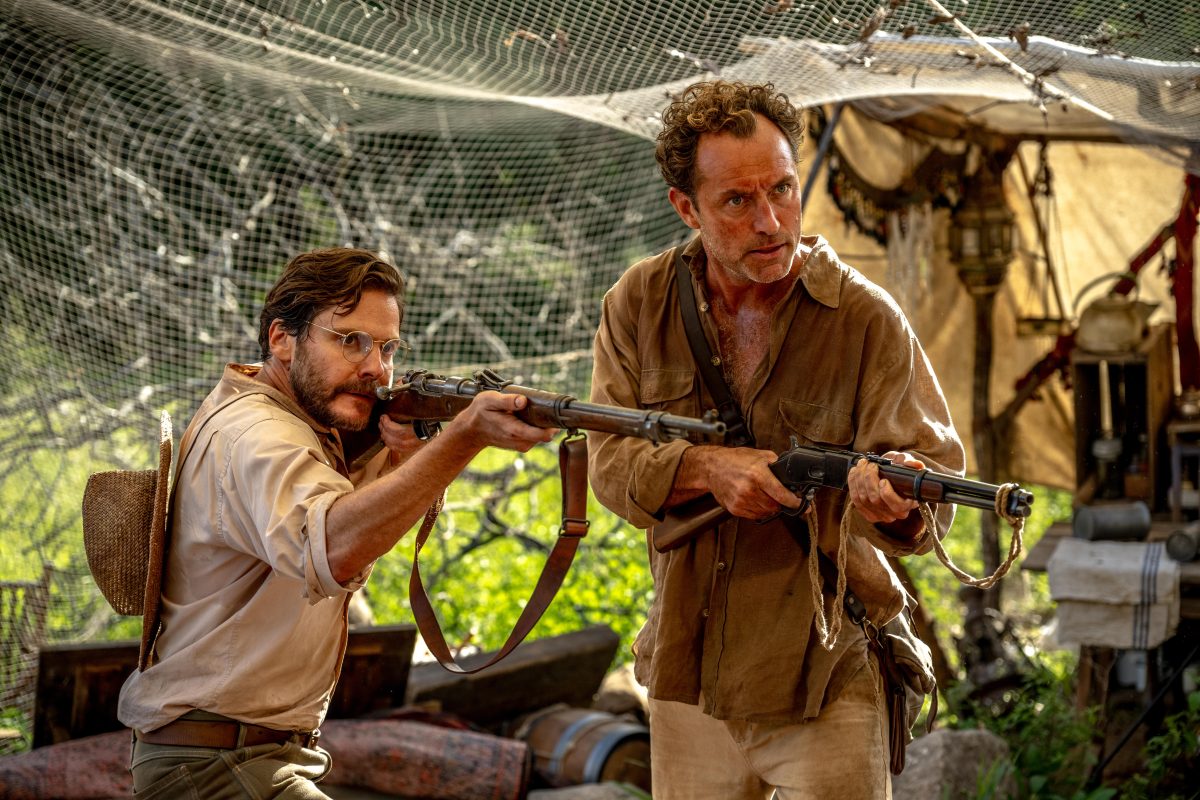
Eloise then devises a scheme to turn Ritter and Dora against the Wittmers by hiding Dora’s donkey in their bushes, prompting Heinz to shoot it unknowingly. Dora is distraught. Ritter and Heinz confront Rudolph and learn the full scope of Eloise’s manipulation. Heinz, now firmly choosing sides, arms himself and joins Ritter to confront her at her camp. She’s mid-intercourse with Robert when they arrive.
Robert comes out first, triggering a physical fight that ends in a fatal duel. Heinz stabs and kills him. Eloise emerges and tries to bribe the men with offers of hotel ownership. Ritter shoots her in the head. They dump both bodies into the sea. Margaret, collecting grass with Harry and baby Rolf, hears the distant gunshot.
What happens to Ritter?
Later, Rudolph visits the Wittmers and claims the Baroness left by ship, showing them a letter. But Margaret and Dora sense deceit—Eloise’s belongings remain untouched in her camp. Even Ritter pretends to be suspicious, making Heinz increasingly uncomfortable. Margaret finds The Picture of Dorian Gray in the camp and confronts Heinz about his loaded rifle, suspecting Ritter may frame them for murder. Her instincts prove right: Ritter sends a letter to the mainland accusing Heinz.
Meanwhile, Rudolph sells off Eloise’s possessions—some to Ritter and the Wittmers, the rest to a shipman—before fleeing the island. Dora, disillusioned by Ritter’s descent into cruelty, confronts him. In response, he violently yanks out her tooth with pliers. Later, Margaret offers Dora healthy chickens, knowing hers are infected. Dora refuses. Margaret pleads with her to pick the moral side, warning that Ritter is growing monstrous. Dora insists Ritter is a visionary incapable of violence. But in quiet retaliation, she poisons him by feeding him infected chicken.
Mainland police arrive in Floreana following Ritter’s letter, only to find him dead. They interrogate the Wittmers, ready to arrest Heinz. Margaret, however, presents a clever, measured account of both deaths and persuades them with calm logic. Instead, the police arrest Dora. When asked if the Wittmers want to leave, Margaret refuses. “This is home,” she says.
End-credit text reveals that Margaret lived in Floreana until her death in 2000 at the age of 96, and her descendants still live there. Dora, upon returning to Germany, wrote a book about her experiences. Margaret wrote a rebuttal shortly after. Rudolph and the sailor he fled with never reached Isabela. The Baroness and Robert’s bodies were never found.


